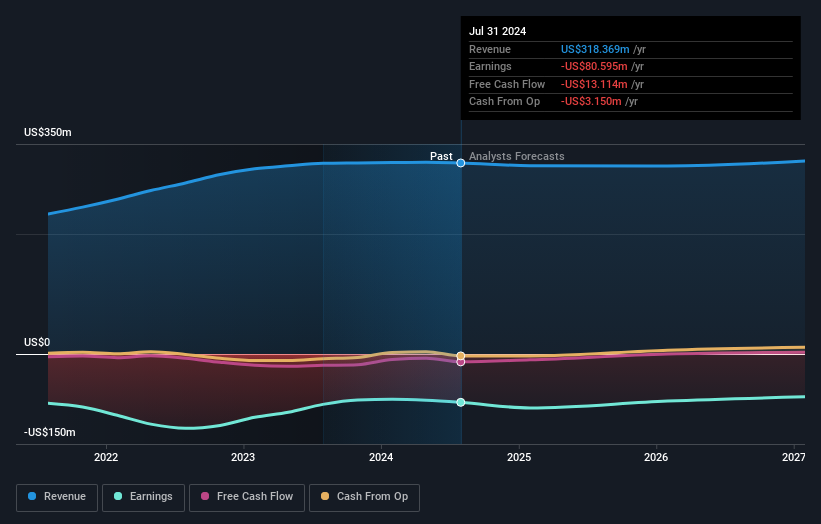- United States
- /
- Software
- /
- NasdaqGM:DOMO
Positive week for Domo, Inc. (NASDAQ:DOMO) institutional investors who lost 25% over the past year

Key Insights
- Significantly high institutional ownership implies Domo's stock price is sensitive to their trading actions
- A total of 9 investors have a majority stake in the company with 51% ownership
- Insiders have bought recently
A look at the shareholders of Domo, Inc. (NASDAQ:DOMO) can tell us which group is most powerful. And the group that holds the biggest piece of the pie are institutions with 64% ownership. In other words, the group stands to gain the most (or lose the most) from their investment into the company.
Last week's US$28m market cap gain would probably be appreciated by institutional investors, especially after a year of 25% losses.
In the chart below, we zoom in on the different ownership groups of Domo.
Check out our latest analysis for Domo

What Does The Institutional Ownership Tell Us About Domo?
Institutions typically measure themselves against a benchmark when reporting to their own investors, so they often become more enthusiastic about a stock once it's included in a major index. We would expect most companies to have some institutions on the register, especially if they are growing.
We can see that Domo does have institutional investors; and they hold a good portion of the company's stock. This suggests some credibility amongst professional investors. But we can't rely on that fact alone since institutions make bad investments sometimes, just like everyone does. When multiple institutions own a stock, there's always a risk that they are in a 'crowded trade'. When such a trade goes wrong, multiple parties may compete to sell stock fast. This risk is higher in a company without a history of growth. You can see Domo's historic earnings and revenue below, but keep in mind there's always more to the story.

Investors should note that institutions actually own more than half the company, so they can collectively wield significant power. We note that hedge funds don't have a meaningful investment in Domo. Looking at our data, we can see that the largest shareholder is The Vanguard Group, Inc. with 13% of shares outstanding. Meanwhile, the second and third largest shareholders, hold 12% and 8.5%, of the shares outstanding, respectively. Joshua James, who is the second-largest shareholder, also happens to hold the title of Chief Executive Officer.
We also observed that the top 9 shareholders account for more than half of the share register, with a few smaller shareholders to balance the interests of the larger ones to a certain extent.
While it makes sense to study institutional ownership data for a company, it also makes sense to study analyst sentiments to know which way the wind is blowing. There are a reasonable number of analysts covering the stock, so it might be useful to find out their aggregate view on the future.
Insider Ownership Of Domo
While the precise definition of an insider can be subjective, almost everyone considers board members to be insiders. The company management answer to the board and the latter should represent the interests of shareholders. Notably, sometimes top-level managers are on the board themselves.
Most consider insider ownership a positive because it can indicate the board is well aligned with other shareholders. However, on some occasions too much power is concentrated within this group.
Our most recent data indicates that insiders own a reasonable proportion of Domo, Inc.. Insiders have a US$45m stake in this US$281m business. We would say this shows alignment with shareholders, but it is worth noting that the company is still quite small; some insiders may have founded the business. You can click here to see if those insiders have been buying or selling.
General Public Ownership
With a 20% ownership, the general public, mostly comprising of individual investors, have some degree of sway over Domo. While this size of ownership may not be enough to sway a policy decision in their favour, they can still make a collective impact on company policies.
Next Steps:
While it is well worth considering the different groups that own a company, there are other factors that are even more important. Take risks for example - Domo has 3 warning signs (and 1 which is a bit unpleasant) we think you should know about.
Ultimately the future is most important. You can access this free report on analyst forecasts for the company.
NB: Figures in this article are calculated using data from the last twelve months, which refer to the 12-month period ending on the last date of the month the financial statement is dated. This may not be consistent with full year annual report figures.
New: Manage All Your Stock Portfolios in One Place
We've created the ultimate portfolio companion for stock investors, and it's free.
• Connect an unlimited number of Portfolios and see your total in one currency
• Be alerted to new Warning Signs or Risks via email or mobile
• Track the Fair Value of your stocks
Have feedback on this article? Concerned about the content? Get in touch with us directly. Alternatively, email editorial-team (at) simplywallst.com.
This article by Simply Wall St is general in nature. We provide commentary based on historical data and analyst forecasts only using an unbiased methodology and our articles are not intended to be financial advice. It does not constitute a recommendation to buy or sell any stock, and does not take account of your objectives, or your financial situation. We aim to bring you long-term focused analysis driven by fundamental data. Note that our analysis may not factor in the latest price-sensitive company announcements or qualitative material. Simply Wall St has no position in any stocks mentioned.
About NasdaqGM:DOMO
Domo
Operates a cloud-based business intelligence platform in North America, Western Europe, Canada, Australia, and Japan.
Fair value low.


